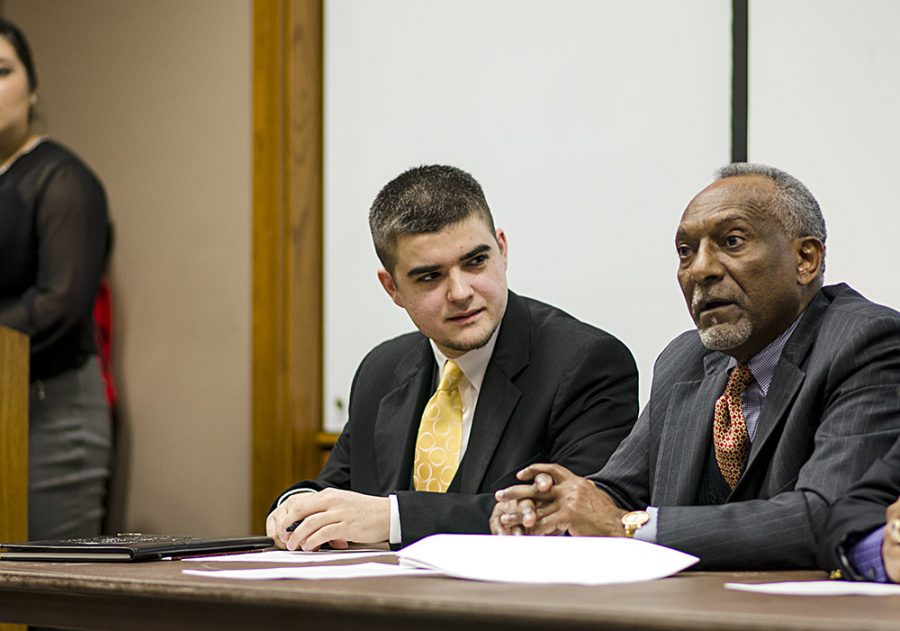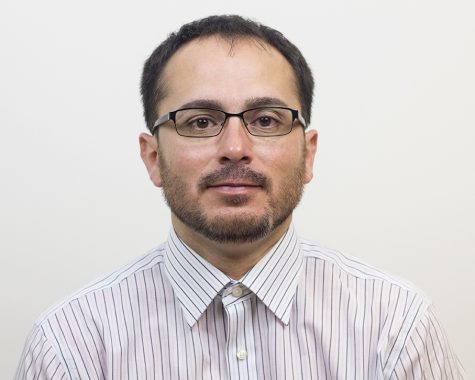Panel discusses President Trump’s executive orders
Jack Cruikshank, center, a graduate student studying political science listens to Teshome Abebe answer a question during the Professional Perspectives panel discussion Wedensday in Lumpkin Auditorium.
February 9, 2017
A panel of speakers discussed proposals made by President Donald Trump, such as the potential building of a wall between the Mexico-United States border, on Wednesday night.
The panel consisted of journalism professor Bryan Murley, economics professor Teshome Abebe, political science professor Kevin Anderson and Jack Cruikshank, a graduate student studying political science.
Abebe said the border tax to build the wall will only stop goods and services such as imports from coming into America.
Murley said the wall is a solution to a problem that does not exist.
“It is estimated to take 15 years to build the wall,” he said. “What happens if Trump fails in four?”
Abebe said the United States has the right to regulate who comes in and out of the United States, but building a wall is illegal.
“The president does not have the legal authority to build a wall,” Anderson said.
Also talked about in the panel was Trump removing two regulations for every one he puts into effect during his presidency.
“It sounds great on the campaign trail,” Cruikshank said.
Abebe said it is beneficial to assume the regulations to be removed were not needed in the first place.
He said regulations are usually requested and that is why the government has them.
“I want to know if the Trump administration will be announcing what regulations will be cut,” Cruikshank said.
Anderson said when crisis hits people usually run to the government to solve the issue in something he calls the “The Ratchet Effect.”
The panel acknowledged that agencies such as Homeland Security, which was implemented after 9/11, continue to exist after the nation’s recovery.
Another topic discussed was Trump using his power with executive orders and the war he has waged against the media.
“The role of the other two branches of the government is getting lost,” Cruikshank said. “…It’s a power grab by demeaning the other branches of government. We need to be cautious of that.”
Anderson said historically, executive orders were not used very often, and former President Barack Obama actually had the lowest amount of executive orders made in 120 years.
Executive orders are used when the president cannot get Congress to do things he wants, Anderson said.
Murley said the mainstream media has been remarkably restrained when reporting on the executive orders.
“The entire administration has waged a war against balanced reporting,” Murley said.
Cruikshank said Trump praises those who portray him in a manner he wants to be portrayed in, but threatens to ruin the careers of those who do not.
“I think we need to acknowledge Trump’s ego issue,” Cruikshank said.
During the Q&A portion of the night, an audience member asked Murley if he thought the news being reported is fair and balanced.
Murley responded saying that he would caution the audience as news consumers because reporters will repeat anything that politicians say.
“We should report the context of political statements that were made,” he said.
He recommended the audience to check multiple news sources for the same information because facts can be presented in different ways.
Liz Stephens can be reached at 581-2812 or [email protected].















































